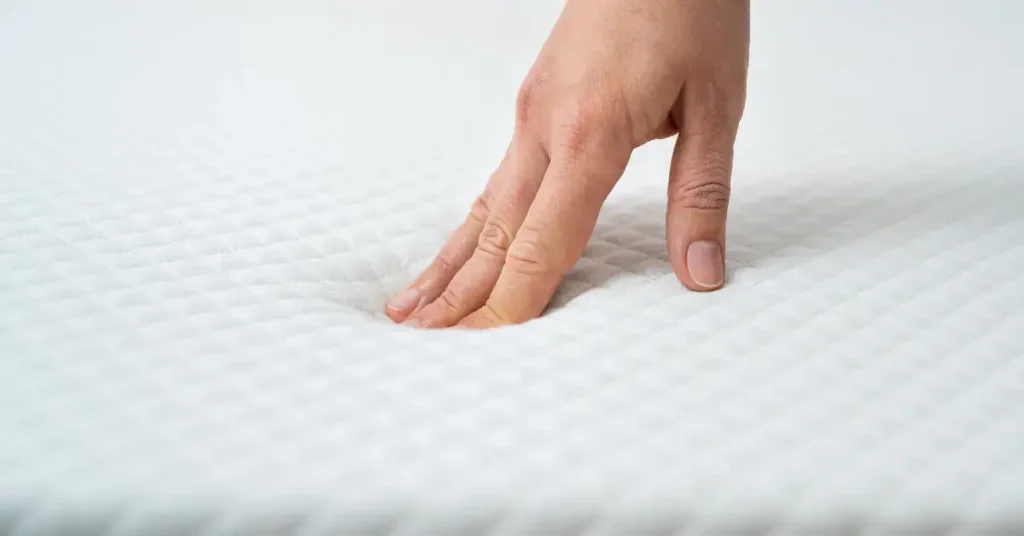Sleep and how many hours we sleep are often overlooked in our weight loss journey.
How we sleep can impact our weight loss journey in various ways, including factors such as digestion, spine alignment, and overall comfort. This article will explore the pros and cons of different sleeping positions and highlight the best sleeping positions for weight loss.
Finding the ideal sleeping position for weight loss can promote better digestion, reduce discomfort, and improve sleep quality. However, it’s important to note that individual preferences, sleep conditions, and other factors may influence which sleeping position is most suitable for each person.
Best sleeping positions
Let’s begin by identifying if there is a ‘best’ sleeping position for weight loss.
Sleeping positions play a crucial role not only in ensuring a restful night’s sleep but also in various aspects, including weight loss. Different sleeping positions can impact our overall health and well-being.
For example, sleeping on your back is often considered beneficial for weight loss. It allows for proper alignment of the spine and promotes good posture. Side sleeping, particularly on the left side, can be advantageous for weight management. It helps improve digestion and reduces the risk of acid reflux.
We’ve compiled the best sleeping positions that can help with weight loss and have several other benefits.
Fetal position
The fetal sleeping position, where an individual sleeps on their side with their knees drawn towards their chest, offers several benefits for sleep and can indirectly support weight loss efforts.
The fetal position can improve spinal alignment, reducing the risk of discomfort and back pain. Keeping the spine in a neutral position promotes better posture during sleep. This can contribute to overall comfort and help prevent any potential sleep disturbances hindering weight loss progress.
It also aids in reducing snoring and symptoms of sleep apnea. Side sleeping helps keep the airway open and unobstructed, allowing for smoother airflow. Individuals can achieve better quality sleep by reducing the likelihood of snoring or experiencing breathing disruptions during sleep, which is crucial for weight management. It also helps improve sleep quality, positively impacting weight loss efforts by supporting hormonal regulation and metabolic functioning.
Sleeping on your side
Sleeping on one’s side is a beneficial sleep position that has the potential to assist in weight loss efforts. It can improve digestion by reducing the likelihood of acid reflux and facilitating the proper flow of gastric juices. Side sleeping is also advantageous for minimizing snoring and sleep apnea symptoms, thereby enhancing overall sleep quality. Additionally, it aids in spinal alignment and alleviates back pain, leading to enhanced comfort. Although side sleeping does not directly burn calories, it indirectly supports weight loss by promoting better sleep quality. This, in turn, can influence factors like appetite regulation and energy levels.
Sleeping on your stomach
Sleeping on your stomach is also known as the prone position. It is a sleeping posture with potential benefits but may not directly contribute to weight loss. It can help reduce snoring and symptoms of sleep apnea, as it keeps the airway open. This may also alleviate acid reflux for some individuals.
However, sleeping on your stomach may strain the neck and spine, potentially causing discomfort or pain. It helps in better sleep quality, which helps in weight management and improves the body’s overall health.
Sleeping with legs up
Sleeping with your legs up is also known as the elevated or legs-up position. It is a sleeping posture that offers several benefits, including potential support for weight loss. This position helps facilitate better blood circulation, reducing swelling and pressure in the lower extremities. Improved circulation can aid in lymphatic flow and waste removal, potentially supporting the body’s natural detoxification processes. Additionally, the elevated legs position may help alleviate symptoms of conditions like varicose veins or oedema.
Is there any sleeping position best for weight loss?
Although no definitive evidence supports a single best sleeping position for weight loss, certain positions can indirectly contribute to weight management. Sleeping on your back helps align the spine and aids digestion, while side sleeping may reduce snoring and symptoms of sleep apnea, potentially improving sleep quality.
However, sustainable weight loss relies on a holistic approach that combines a balanced diet, regular exercise, and healthy lifestyle habits. Regardless of the position, prioritizing sufficient and restful sleep is essential, as high-quality sleep positively affects overall health, metabolism, and weight management.
Ways to improve sleep
Pillows: Necessary or bane

Pillows are generally essential for achieving good quality sleep as they provide comfort and support to the head, neck, and spine and assist in maintaining proper alignment. They help alleviate pressure points and promote better sleep posture, ultimately contributing to restful sleep.
However, pillows can become a disadvantage if they are not well-suited or lack support, leading to potential neck and spine alignment issues. Some individuals may also encounter allergies or respiratory problems due to allergens present in pillows.
Personal preferences regarding pillows can vary, underscoring the importance of finding the appropriate pillow that caters to individual needs. Selecting the right pillow is vital for ensuring optimal comfort and attaining high-quality sleep.
Mattress: Which one to choose, soft, hard, or firm?

Selecting the appropriate mattress for optimal sleep quality relies on individual preferences and requirements, as there is no universally applicable choice. Soft mattresses provide a plush and cushioned sensation, which can aid in alleviating pressure points. Firm mattresses deliver enhanced support and alignment, particularly for individuals with back pain or who prefer a firmer surface.
Medium-firm mattresses balance comfort and support, accommodating a broad range of sleepers. Ultimately, the ideal mattress ensures proper spinal alignment, provides sufficient support, and aligns with personal comfort preferences. Experimenting with different mattresses and considering factors such as body type, sleeping position, and specific needs can aid in discovering the most suitable option.
Afternoon sleep: Do we need those?

Afternoon naps can benefit some individuals, but whether we need them depends on individual circumstances and preferences. Taking a brief nap in the afternoon can boost energy, improve cognitive function, and enhance mood. It can help combat drowsiness and increase alertness, especially for those who experience midday fatigue or have irregular sleep patterns.
However, some may find that afternoon naps disrupt their nighttime sleep or make it harder to fall asleep later. It’s important to listen to your body and consider your specific sleep needs and routines to determine whether afternoon naps benefit you.
Power Naps: Are they helpful?

Power naps have the potential to deliver an instant boost of energy, enhance cognitive function, sharpen focus, and improve productivity. These short periods of sleep can effectively combat drowsiness and promote alertness, making them especially beneficial during the day when experiencing fatigue. Moreover, when kept brief, power naps are less likely to interfere with nighttime sleep, allowing individuals to enjoy their full restorative sleep later.
When is a good time to eat food and drink water before sleeping?
To promote proper digestion and avoid discomfort or indigestion that can disrupt sleep, it is generally recommended to have your final meal or snack at least 2-3 hours before bedtime. However, going to bed hungry can also disturb sleep, so if necessary, a light and easily digestible snack can be consumed 1-2 hours before sleep.
As for water intake, maintaining hydration throughout the day is crucial, but it is advisable to limit fluid consumption in the hours preceding bedtime to minimize the need for nighttime bathroom visits that can disrupt sleep.
Key takeaways for sleeping position
Optimal sleep quality is crucial for weight loss, and sleeping positions play a role in achieving this. Choosing the right sleeping position promotes spinal alignment, reduces discomfort, and enhances sleep posture, ultimately leading to better sleep quality. Improved sleep quality positively impacts appetite regulation, metabolism, and energy levels, contributing to weight management.
Whether sleeping on your back for proper alignment, on your side to reduce snoring or finding a position that suits your comfort, prioritizing good sleep quality supports the overall weight loss journey. Sleeping positions indirectly contribute to successful weight management and overall well-being by ensuring restful and rejuvenating sleep.
Weight loss is achieved by managing various factors which affect weight directly or indirectly. Therefore, it gets easier when you have a professional to assist you. Elevate Now’s obesity specialist doctors specialise in helping individuals struggling with weight loss by using tailor-made strategies.
They use clinically tested weight loss supplements, diet plans, and workout regimes that are personalised according to your body’s needs. You can find help with weight loss by signing up with Elevate Now today.
There is no specific way to reduce belly fat while sleeping, but good quality sleep contributes to weight loss. One can achieve weight loss goals by maintaining a calorie-deficit diet, regular exercise, and managing stress. These factors support weight loss and fat burning, and the body’s metabolism operates during sleep.
The choice of sleeping position can indirectly impact weight management. Sleeping on your back can reduce acid reflux and improve digestion, improving overall well-being. Furthermore, opting for a position that correctly aligns the spine and minimizes discomfort can enhance sleep quality. This, in turn, indirectly supports healthy lifestyle habits like regular exercise and a balanced diet. While sleeping doesn’t directly burn fat, it can contribute to a more favourable environment for weight management and promote overall health.
Losing a substantial amount of belly fat within a two-week timeframe is difficult. You can create a caloric deficit by reducing portions and choosing healthier foods. Incorporate regular aerobic exercises like brisk walking or cycling to burn calories.




